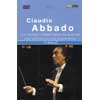Claudio Abbado in Rehersal
A curious hodge-podge of rehearsals harnessed to pretentious images
View record and artist detailsRecord and Artist Details
Composer or Director: Giuseppe Verdi
Genre:
DVD
Label: Arthaus Musik
Magazine Review Date: 11/2002
Media Format: Digital Versatile Disc
Media Runtime: 119
Mastering:
Mono
Catalogue Number: 101 124

Tracks:
| Composition | Artist Credit |
|---|---|
| Messa da Requiem |
Giuseppe Verdi, Composer
Cecilia Gasdia, Soprano Chris Merritt, Tenor Claudio Abbado, Conductor Giuseppe Verdi, Composer Lucia Valentini-Terrani, Mezzo soprano Milan La Scala Chorus Milan La Scala Orchestra Montserrat Caballé, Soprano Peter Dvorský, Tenor Samuel Ramey, Bass |
Author: Alan Blyth
What we have here is a German film of Abbado preparing two performances of the Requiem at Milan in 1985. The venues are St Mark’s Church, La Scala (orchestra only) and a rehearsal room, where he works with the soloists of the second performance. Each movement has incorporated at the beginning a moralising voice, reading some quasi-religious tosh while we are shown alternating images of a wealthy audience, of pop-art and of Christ’s suffering. It is a pretentious offering typical of the worst of German directorial self-importance.
Rescued from it are a number of moments when Abbado is seen and heard persuading a singer, such as Samuel Ramey in ‘Mors stupebit’, to add expression to his or her singing. He and Valentini-Terrani, a deeply eloquent mezzo, are common to both performances. The soprano and tenor in each is very different. Caballé’s exquisite but sometimes a shade over-articulated singing in the first being replaced by the young Cecilia Gasdia (whose name is misspelt Gaschia on the box cover!) less sophisticated, more straightforward, finely poised in the second. Dvorsk≥’s attractive but rather anonymous tenor in the first performance is contrasted with the more etiolated but interesting voice of Chris Merritt in the second. It is a pity we never get to hear either Gasdia or Merritt with the orchestra. At all times and with all his forces, Abbado is a sympathetic and constructive leader.
The picture and sound quality are adequate, no more. This curiosity will mainly appeal to Abbado completists and to those who want everything by one or other of the soloists, all of whom are certainly worth hearing.
Rescued from it are a number of moments when Abbado is seen and heard persuading a singer, such as Samuel Ramey in ‘Mors stupebit’, to add expression to his or her singing. He and Valentini-Terrani, a deeply eloquent mezzo, are common to both performances. The soprano and tenor in each is very different. Caballé’s exquisite but sometimes a shade over-articulated singing in the first being replaced by the young Cecilia Gasdia (whose name is misspelt Gaschia on the box cover!) less sophisticated, more straightforward, finely poised in the second. Dvorsk≥’s attractive but rather anonymous tenor in the first performance is contrasted with the more etiolated but interesting voice of Chris Merritt in the second. It is a pity we never get to hear either Gasdia or Merritt with the orchestra. At all times and with all his forces, Abbado is a sympathetic and constructive leader.
The picture and sound quality are adequate, no more. This curiosity will mainly appeal to Abbado completists and to those who want everything by one or other of the soloists, all of whom are certainly worth hearing.
Discover the world's largest classical music catalogue with Presto Music.

Gramophone Digital Club
- Digital Edition
- Digital Archive
- Reviews Database
- Full website access
From £8.75 / month
Subscribe
Gramophone Full Club
- Print Edition
- Digital Edition
- Digital Archive
- Reviews Database
- Full website access
From £11.00 / month
Subscribe
If you are a library, university or other organisation that would be interested in an institutional subscription to Gramophone please click here for further information.




